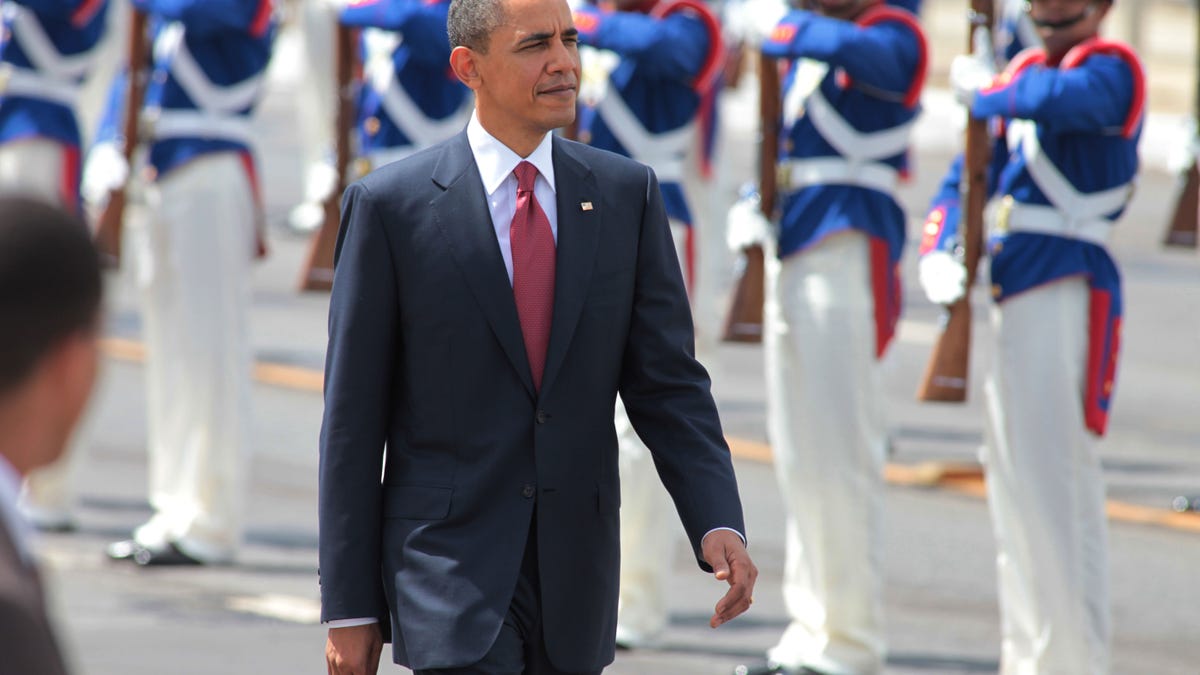
President Obama arrives to Planalto palace in Brasilia, Brazil, Saturday March 19, 2011. (AP) (AP2011)
After facing criticism, including from some in his own party, for not taking a tougher stance against Col. Muammar al-Qaddafi's crackdown on an uprising in Libya, President Obama's decision to launch airstrikes on Libyan military sites represents a shift in the administration's tactics on Middle East unrest -- but challenges still remain, both in Libya and the rest of the region.
In remarks Friday after the U.N. authorized force against Libya, Obama painted his administration's response to the Libya crisis as calculated rather than confused, as the steady increase in international pressure on the Qaddafi regime ensured the U.S. wouldn't be perceived as pursuing unilateral action against an Arab country.
It remains to be seen whether the initially volley of missiles on Libyan military targets will lay the foundation for Qaddafi's ouster, which the administration and other world leaders have called for. Qaddafi, for his part, has vowed to strike back and turn the Mediterranean into the "real battlefield."
And the list of trouble spots on the United States' Mideast agenda doesn't stop with Libya.
In Yemen, the U.S.- backed president is under pressure to end his bloody crackdown on protesters who have been waging massive demonstrations for more than a month. President Ali Abdullah Saleh's forces killed at least 46 people Friday and wounded hundreds more Friday in the bloodiest single day of the popular uprising, drawing condemnation from the U.N. and the U.S. , which backs his government with hundreds of millions in military aid to battle a dangerous Al Qaeda offshoot based in Yemen's mountainous hinterlands.
And other countries in the region, including Saudi Arabia and Bahrain, have faced uprisings of their own, putting the United States in the tough spot of supporting pro-democracy movements without angering key Arab partners.
While Obama has repeatedly promised that he will not send ground troops there, it is not clear what he will do next in Libya if Britain, France and other allies leading the coalition find Qaddafi's regime more resilient than expected.
Defense Secretary Robert Gates had expressed reservations over intervening in Libya with the military already stretched thin in Afghanistan and Iraq. But Obama said Saturday that he was convinced it was necessary to use force to save the lives of civilians.
"We cannot stand idly by when a tyrant tells his people there will be no mercy," he said in Brasilia.
Deputy National Security Adviser Ben Rhodes, echoing other administration officials, emphasized the involvement of the international community in challenging Qaddafi when asked how the current military action fits into the "Obama doctrine."
Rhodes said Qaddafi lost legitimacy in the eyes of the international community each time he ignored its calls to stop the violence.
This is not a unilateral action, Rhodes said. "We have partners involved in this."
Democratic strategist Martin Frost, a former Texas congressman, told Fox News that he believes Obama was right to line up support from the Arab League and the U.N. before taking decisive action.
"We didn't want to go in by ourselves," he said. "We're not very popular in that part of the world."
Obama's approach hasn't hurt his popularity in the polls. But on the flip side, it hasn't helped him either. His approval ratings are hovering below 50 percent, hardly a ringing endorsement.
While the popular uprisings that began in Tunisia and spread to Egypt and other parts of the region have marked the beginning of a new era in the Arab world, Obama has been criticized for not taking a more active role in helping protesters, particularly in Egypt.
For weeks, the administration wavered between supporting the protesters and Hosni Mubarak, who was a U.S. ally for decades.
"He has taken a measured response to deal with some very difficult situations," Frost said, adding that he supported Obama's response to the Egyptian revolution.
"The Egyptian military eventually decided Mubarak had to go and Mubarak went," he said.
But Phil Musser, a Republican strategist who is a senior adviser to former Minnesota Gov. Tim Pawlenty said, Obama's measured responses carries the risk of making the U.S. look weak.
"I think the question on the table is whether or not being measure in the context of dealing with the Russians, dealing with the Egyptian crisis, dealing with the situation in Libya, over time the question is: is the president leading the world with America at the forefront or are we taking a backseat to different elements of our friends and allies around the globe?"











































